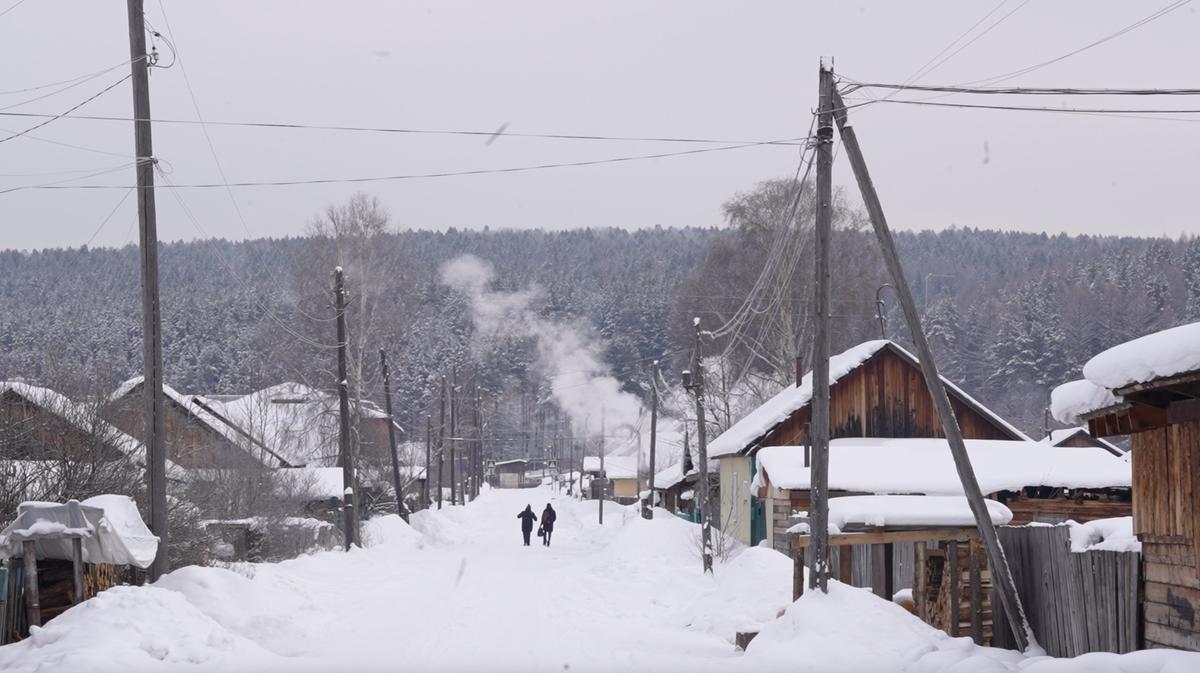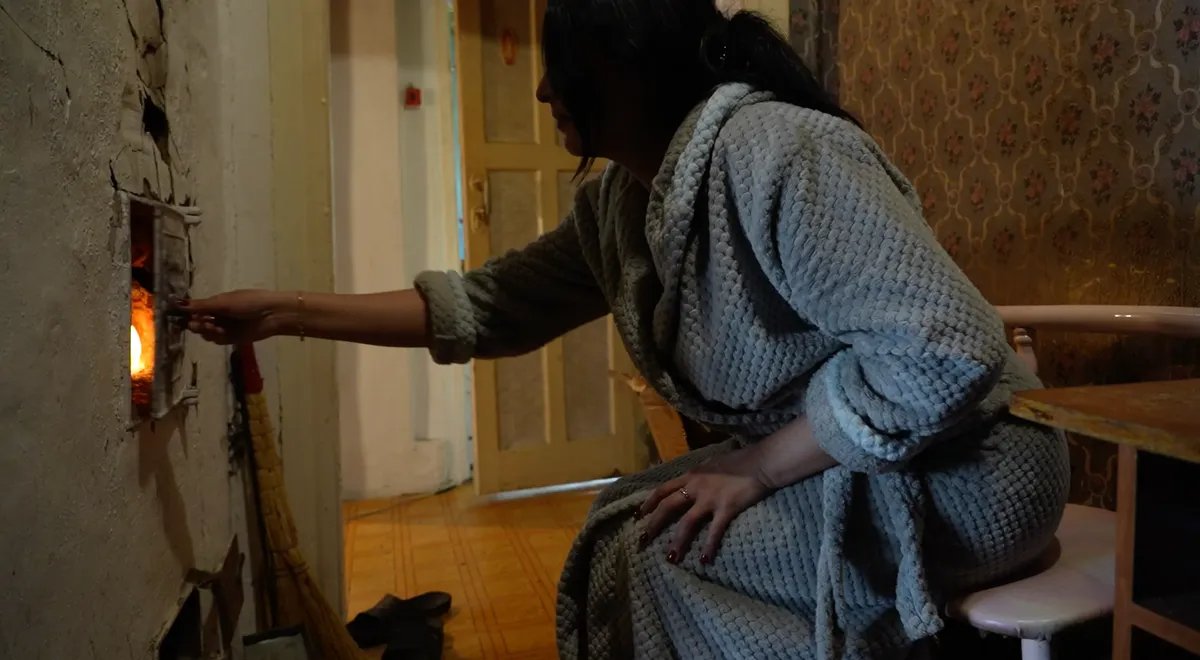This report was originally published on the website of Novaya Gazeta. We thank our colleagues for the opportunity to publish its translation with minor cuts.
This article was conceived as a report on a paradox: 88% of Russia’s natural gas reserves are located in Siberia, but Siberia is the least gasified macro-region of the country, with only 16.8% of households having access to gas. The gas pipeline bearing the loud and advertised name “The Power of Siberia” pumps gas to China, while people living in the immediate vicinity of it are still forced to rely on firewood for heating.
Against the background of sanctions, the Russian authorities announced their intention to actively develop the domestic supply market, and so we went to the Krasnoyarsk and Irkutsk regions to find out if local residents are expecting gasification.
However, it turned out on the spot that gas is not the first thing on the Siberians’ minds. They are waiting for their relatives who have been mobilised to Ukraine to return home. In the winter of 2023, it turned out to be impossible to avoid the topic of the special operation (Novaya Gazeta uses the term “special operation” as it is forced to operate under Russia’s censorship laws — translator’s note). It was everywhere we went: relatives of the mobilised were put on the lists of those in need of firewood, and local officials actively told us how they helped families who went to the front line.
This story is about the gas that has not yet reached Siberia, and about the sorrow that has already reached it. About the people who live in cold houses, often with no means to buy firewood.
Part I. In the smoke
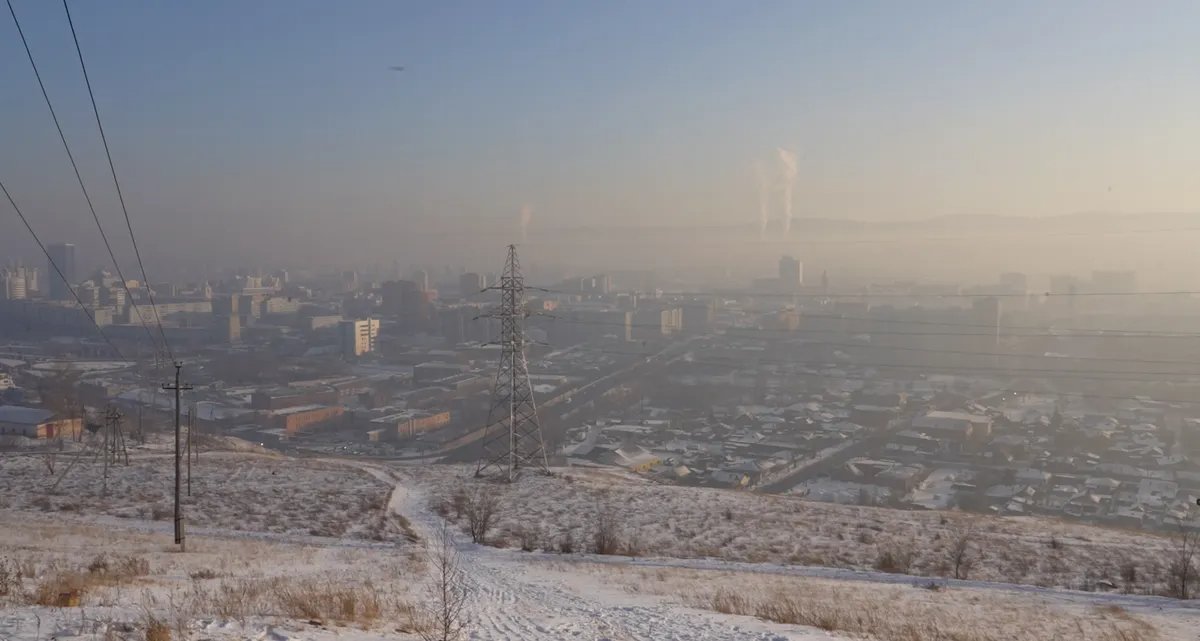
“Black sky mode”, Krasnoyarsk. A shot from the film “Firewood for the mobilised”
Krasnoyarsk is filled with thick smog right now. This often happens here — up to 70 days a year. There is no wind, the veil does not dissipate. The townspeople call it the “black sky mode”.
“Black sky” is created by industrial enterprises and three coal-fired thermal power plants that heat Krasnoyarsk. Their emissions are mixed with smoke from chimneys: the private sector is large here and almost all is heated with firewood.
Smog is dangerous: it affects the mucous membrane and respiratory organs, and up to 5% of deaths from lung cancer are associated with its exposure.
But smog brings money: there is a strong coal lobby in the Krasnoyarsk region — SUEK coal energy company works here with a turnover of almost $10 billion a year, and the governor’s son Artem Uss owns a coal mine.
Switching to gas could solve the problem of the “black sky”. In 2021, Gazprom published a map with a five-year plan for gasification of the regions. But they did not even plan to build a single gas pipeline in the Krasnoyarsk region with a population of 2.8 million people. And this is despite the fact that it ranks second in the country in terms of gas reserves — after the Tyumen region.
Krasnoyarsk is only in 32nd place in terms of income of the population. About 16% of the inhabitants of the region are below the poverty line. And in the cold winter of 2023, many of them simply have no money to buy firewood with.
Regional TV channel TVK decided to come to their aid: journalists launched a map on which anyone in need can leave their address and phone number, and people who care can help them by ordering firewood. Now there are more than a hundred applications on the map. Two dozen people managed to get help.
- “I am a disabled person, hardly able to walk. I’m running out of firewood, there’s only some left for two days. I have no money to buy more. I’m in a desperate situation, I live in a small hut.”
- “I live alone, I have to use coal to heat my home, there is no money for firewood, my daughter is bedridden, her disability benefits aren’t much.”
Among those in need are the disabled, pensioners, single mothers and… families of the mobilised. For some reason, in a country that promised comprehensive assistance to those leaving for the front line, the relatives of the military turned out to be destitute.
‘Every year it gets worse’
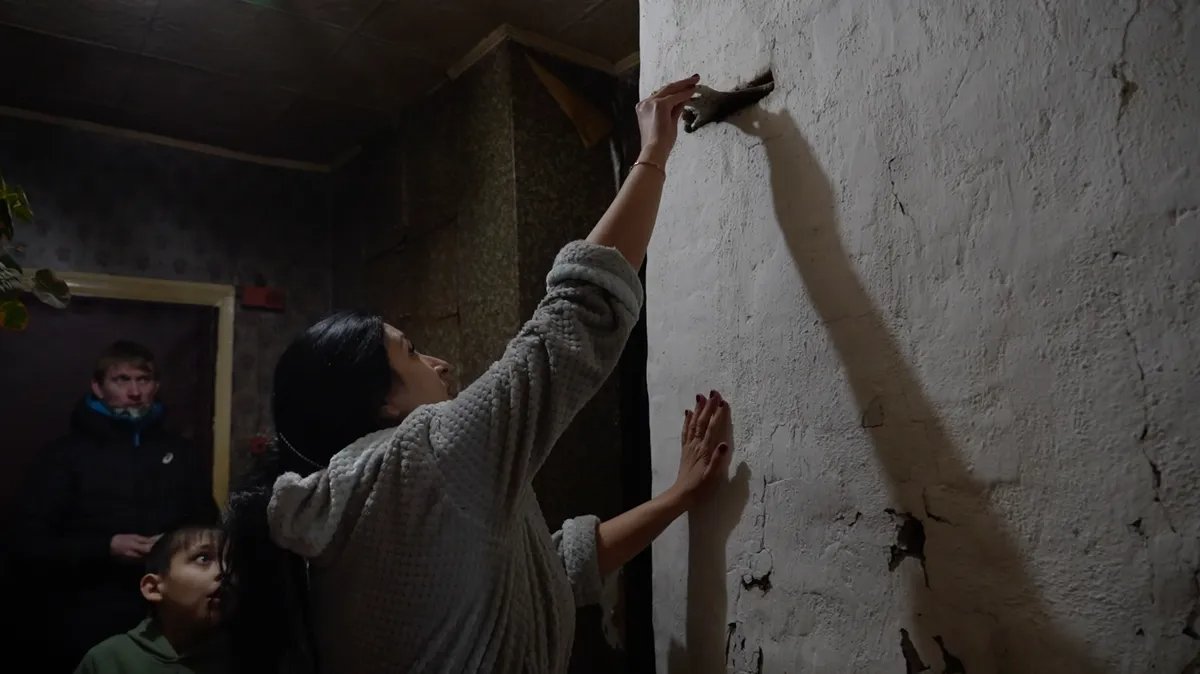
Oksana with her younger son at the stove. A shot from the film “Firewood for the mobilised”
We go to Oksana, the mother of two children, without even thinking about the topic of partial mobilisation. She lives in two-story wooden barracks near the city centre.
Oksana was lucky: the TVK campaign allowed her to get firewood — a stranger from Perm ordered the firewood right for the New Year. It was delivered on 31 December.
“The car with firewood was enough for a month”, the woman says. “And this load of firewood costs 12,000 rubles [€150]. I work as a cook; the salary is about 25,000 [€311].”
It’s hard to give half of your salary for heating. But Oksana has not heard about gasification. And the woman does not believe that the gas will be provided, and that life in general will become easier.
“Every year it gets worse and harder. And it will get even worse,” she concludes. “Everything has become more expensive over the past year. I don’t know if it’s related to the *** [the word “war” is omitted in the original article due to censorship laws — translator’s note] or something else. You go to the store; you buy quite a bit — and a thousand rubles [€12] is gone. Every time you go, you spend a thousand rubles. But I still want to dress normally, put on shoes, live in a normal flat. Sometimes I sit down and think: what’s next? Are there any prospects? We’re falling into an abyss. And it’s not just me who thinks so — as I talk to people, everyone says it’s getting worse. But Ukraine is top priority.”
“Ukraine” reached Krasnoyarsk streets faster than gas or good asphalt, faster than playgrounds or major repairs of houses. And Oksana was more anxious about it than domestic disorder. No wonder — her eldest son is graduating from school soon.
“I don’t know what to do… I won’t let him go there… I’m not raising children to give them away to be torn to pieces,” she says.
And she admits that people around her are trying to pretend that they do not notice what is happening.
“Everyone is like: ‘As long as it doesn’t affect us. Come what may, as long as it doesn’t affect us.’ Everyone is worried about themselves. But this is not OK. It shouldn’t be like this. It’s just that many have become hardened with this life.”
Thus, the topic of Ukraine came up for the first time in this trip, as a result of a mother’s fear for her child. And not a single person with whom we talked further could find it possible to avoid this topic.
‘We will win — and then there will be gas’
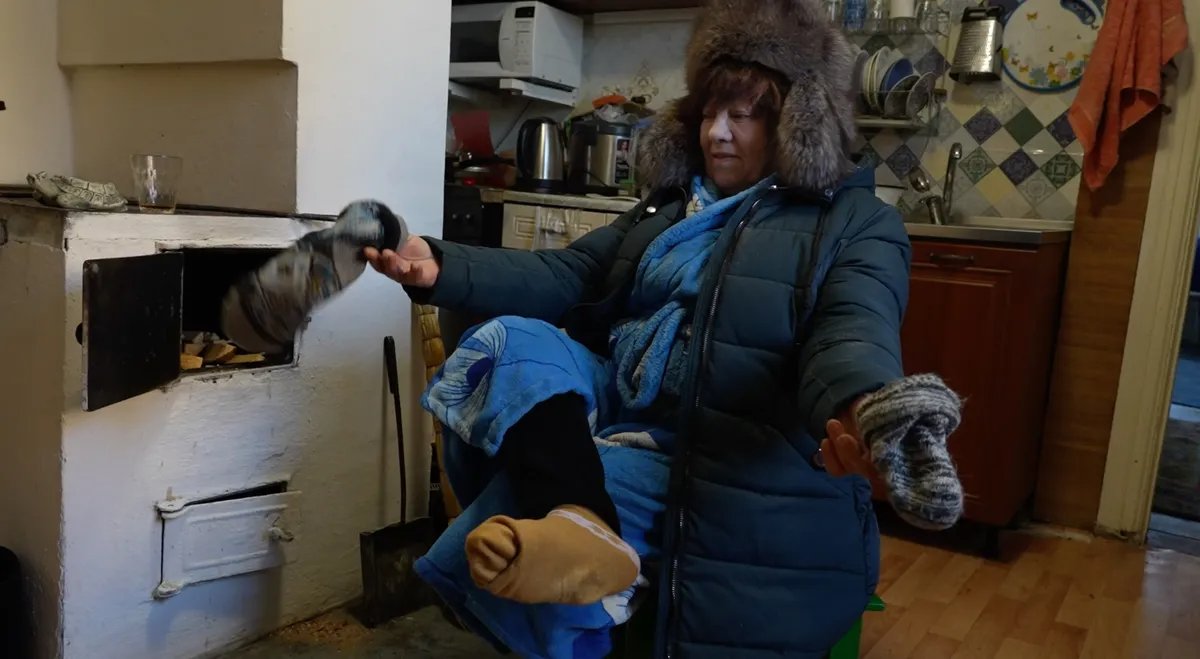
In winter, Olga Vasilyevna wears three pairs of wool socks at home. A shot from the film “Firewood for the mobilised”
Pensioner Olga Vasilyevna moved to Krasnoyarsk from Tulun three years ago, after the flood. She bought a dilapidated house in the Pokrovka micro-district with the compensation money of 2 million rubles [€24,900].
Flooding in Tulun and other settlements in the south-west of the Irkutsk region in 2019 claimed the lives of 26 people, and the woman says about it briefly: “It was scary, very scary.” Then she recalls one of her deceased neighbours.
Olga Vasilyevna herself was evacuated, but life in a new place turned out to be difficult.
“I have a pension slightly above 10,000 [€124]. Two cubes of sawn boards (the cheapest type of firewood — author’s note) cost 4,000 rubles [€49]. And the temperature at home is always 14-15°C. Because I’m saving wood. I wear felt boots and a warm robe all the time.
If someone gave me firewood, I would call Putin in Moscow and say that they saved me.”
She shows her half-empty woodpile, in which a thin pine hump is stacked in two rows.
“I hope there will be enough of my firewood for two months… I will heat it less. I’ll make it to spring somehow,” she says with genuine hope. When it comes to gas, she notes that it is unlikely that her house will ever be connected, but in general the Krasnoyarsk region needs gasification. “Our Siberia is rich, and it’s time to move on from firewood,” and suddenly the pensioner switches to international politics. “We have a forest here, we have gold… So, we will not give Siberia to America or anyone. We will hold on to it ourselves.”
In the house, the TV is on in the background (Olga Vasilyevna has two of them — in each room), and the woman switches to the topic of Ukraine on her own account after watching the news.
“I transferred a thousand rubles [€12] to the military. And my son-in-law transferred some, too. Yes, everyone donated money so that they could buy drones and clothes,” a twinkle appears in the pensioner’s eyes. “We will win by the summer — you’ll see!” she exclaims. “And then we’ll have both gas and light, and they will be cheaper.”
And then she returns to her problems again.
“I turn on flashlights in the evening so as not to waste electricity. I save both electricity and firewood. I wear three pairs of warm socks. If it gets very cold, I’ll look for another pair. There is chicken, coffee, bread — we live alright here,” she tells me convincingly. “Can I offer you something to eat?”
‘I get up and go to the military enlistment office’
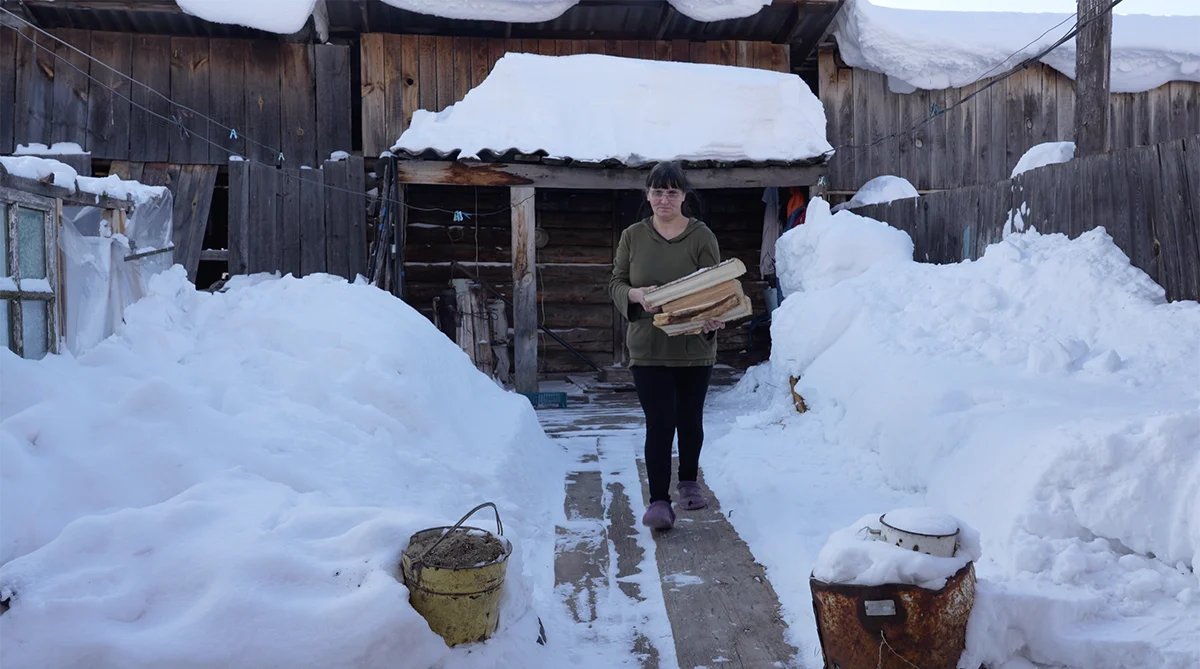
Natalia, the mother of a mobilised soldier, with firewood that her neighbour brings her. A shot from the film “Firewood for the mobilised”
Natalia, the mother of a mobilised soldier, left her address on the Give Firewood map. When we call her, she immediately says: “You can’t help me.” But she does not refuse the meeting.
The village of Kazachinskoye is a district centre 190 kilometres from Krasnoyarsk. Natalia lives in a two-flat wooden house. And her woodcutter is empty. Only chips are scattered on the floor. The woman collects them to warm the house. Fortunately, it’s “only” -16 °C outside.
“I don’t have a job right now, and there is a problem with my work record, which is why I can’t get an allowance. Money is tight,” she says. “My son used to help with the housework. And in September he was taken away.”
Denis is 21 years old, he was mobilised on 30 September.
“He returned from mandatory military service last year, and immediately was eligible for [partial] mobilisation,” the woman says. “He had no intentions of avoiding it,” she says, making it clear that it is not customary to do this in the village. “But he didn’t rush there either.”
“And who would rush there? He didn’t want to go there. We talked about it, he said, ‘I don’t need these hundred thousand rubles [about €1,250, referring to the pay-outs for mobilised soldiers — translator’s note].’
But [the military enlistment office] called… and that’s it.”
According to Natalia and her friend Svetlana, mostly young people were taken away.
Svetlana is now trying to support Natalia as best as she can: including firewood. But worse than the lack of money and firewood is the lack of news about her son.
“On January 11, Denis was in touch for the last time,” Natalia looks thoughtfully out the window. “We talked quite a bit. He usually says that everything is fine with him. He’s always doing well. And then he said that they were in deep shit,” she was crying. “And there were no more calls.”
The local military enlistment office does not tell the mother whether everything is all right with Denis. They politely wave her away and ask to wait. In the village administration and forestry, she gets about the same answer when she asks about firewood: “It’s not allowed.” Although in other areas of the Krasnoyarsk region, families of those mobilised do get help with firewood.
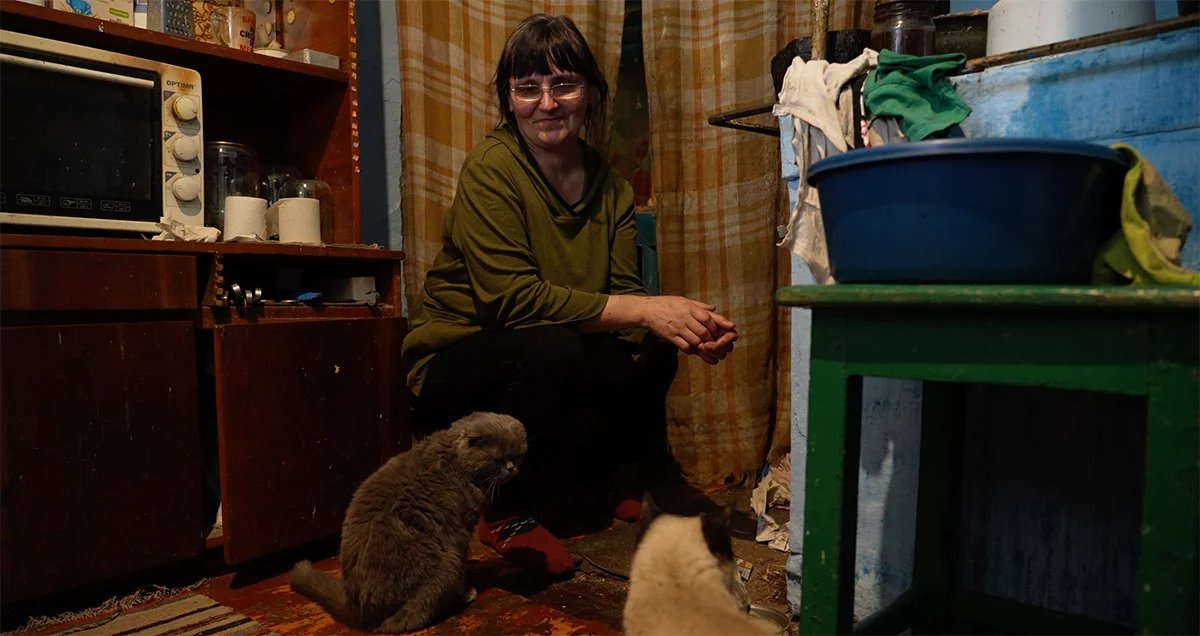
Natalia at the stove. A shot from the film “Firewood for the mobilised”
According to the head of the Kazachinskoye Village Council Alexander Kozlov, the provision of firewood is beyond his authority.
“We don’t prepare firewood; we don’t provide firewood. We don’t have such an expense item,” he explains. “She [Natalia] must submit documents to the forestry that she needs and has the right…”
“She says she was rejected.”
“Well, they shouldn’t have,” the official is lost for words. “If she doesn’t have a single stick right now, then, of course, we will negotiate with some logger to bring her firewood with sponsorship money.”
It is worth saying that the head of the Village Council kept his word: two days after our conversation, firewood was brought to Natalia.
When asked about gasification, the mobilised man’s mother answers briefly: “Well, of course, that would be good. And it would be cheaper.” And she switches back to her son.
“I try not to watch the news now. It used to seem that when a person dies, they die and that’s all, and when the *** started, it started to bring me to tears. It’s very hard to look at the dead. I think that this *** will never end, there’s no chance… Well, why are all of them (she seems to be referring to politicians — author’s note) sitting on their asses, why were our young ones taken away? He just came from the army, let him have a little rest — no…
His life has just begun. And there’s no way to hide, and… it’s terrible, terrible. They said that they would have a vacation, I come to the military enlistment office, they answer me: ‘No, no vacation.’
He’ll be killed, killed. I told him so many times: ‘Don’t get in there.’ He says, ‘It’s not up to me.’ He should have at least lived a little…”
Natalia admits that she can hardly sleep: “I just take a little nap, get up and go to the military enlistment office… I don’t have any hatred for Ukraine… I don’t watch the news, and I don’t have any aggression. They say one thing today, then another the next day. I don’t have dreams because I’m not sleeping.”
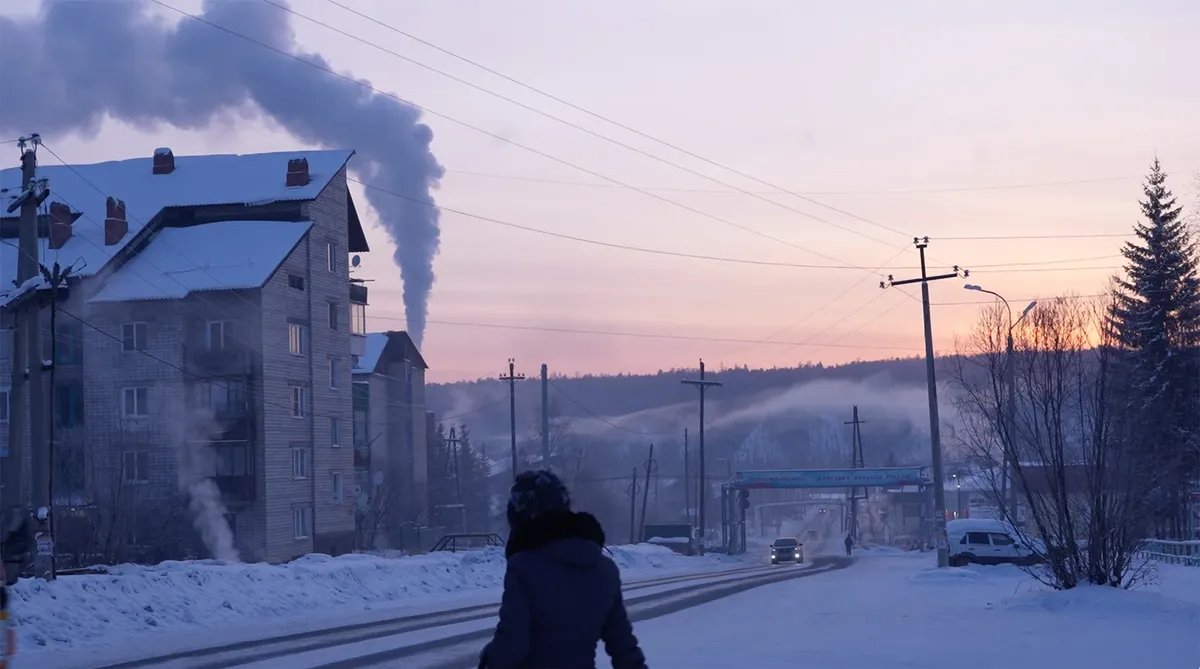
The village of Magistralny, Irkutsk region. A shot from the film “Firewood for the mobilised”
Part II. Furnace
The famous gas pipeline “Power of Siberia” begins in the Irkutsk region, pumping blue fuel to China. At the same time, the gasification of the region stands at 1%. And about five thousand people have been drafted from here, according to the military commissar of Ust-Ilimsk.
‘There are problems related to the special operation’
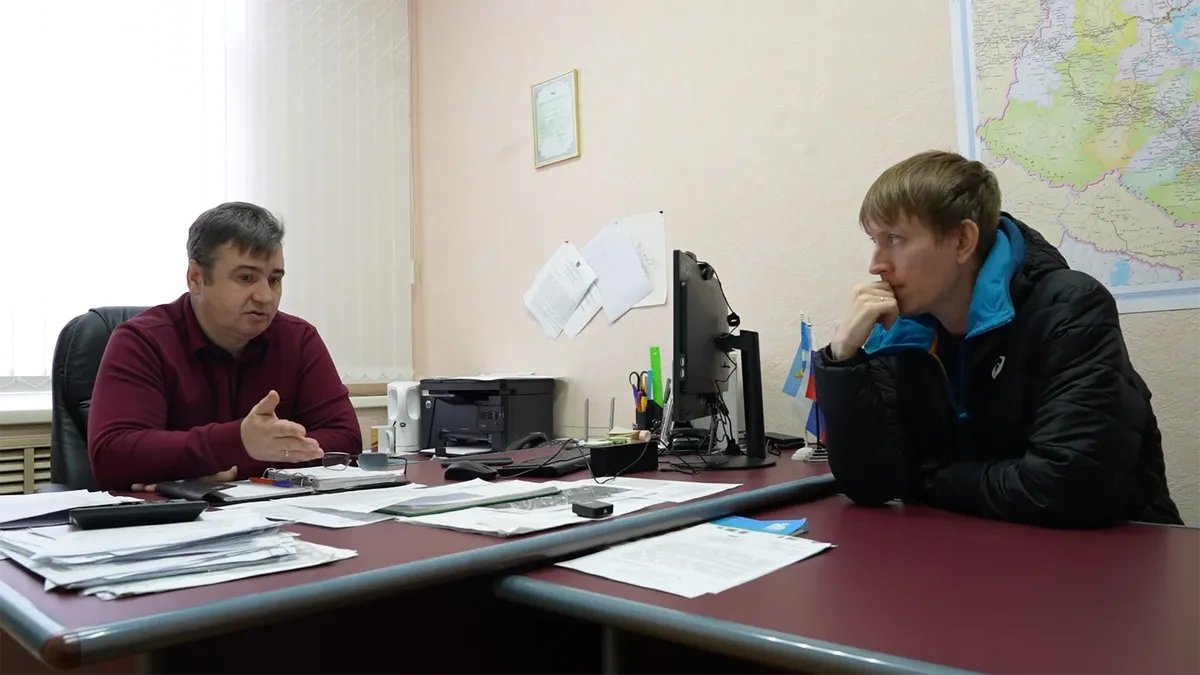
Deputy Mayor of Kazachinskoye-Lensky district Alexey Korotnev. A shot from the film “Firewood for the mobilised”
We go further — to the village of Magistralny. The Kovyktinskoye natural gas field is located near the village, and people here have the opportunity to earn money. Although, of course, there is no gas in the village itself. Just like in the entire district.
“The development of infrastructure, including the provision of people with blue fuel, is carried out within the framework of the execution of the President’s instructions,” explains the Deputy Mayor of the district Alexey Korotnev. “This year, the development of project documentation will be completed, and next year the construction of the gas pipeline network will begin.”
Currently, only apartment buildings and social infrastructure facilities are heated in the village with electricity. And most of the residents heat stoves.
“We have a list of people we help with firewood,” says Deputy Mayor Korotnev. “Including the families of the guys who went to the special military operation. Both the administration and the volunteer movements help them.”
“Yes, we have problems related to the special operation,” the Deputy Mayor of the district unexpectedly turns to this topic. “There will be a funeral soon… the second one. And there are some wounded. Well, this is ***, what can I say. This is ***. If they call me, I’ll go. And my wife knows: if called, I will get up and go. Yes, of course, I feel sorry for the kids. Well, damn, what can you do.”
“We see that the situation is not easy. I’m all for it. If they say they need me, I’ll get up and go. I’m a sniper myself. But they won’t call me because I’m over 50. But I hope that everything will end with the overthrow of the government in Ukraine and the appointment of those who will treat the Russian Federation with understanding. Because, after all, what is Ukraine? Is it a state? And when did it appear? Kyivan Rus? And what came first, ‘Kyivan’ or ‘Rus’?”
The official talked about gas for 15 minutes, and about Ukraine for 20.
A soldier from Transneft
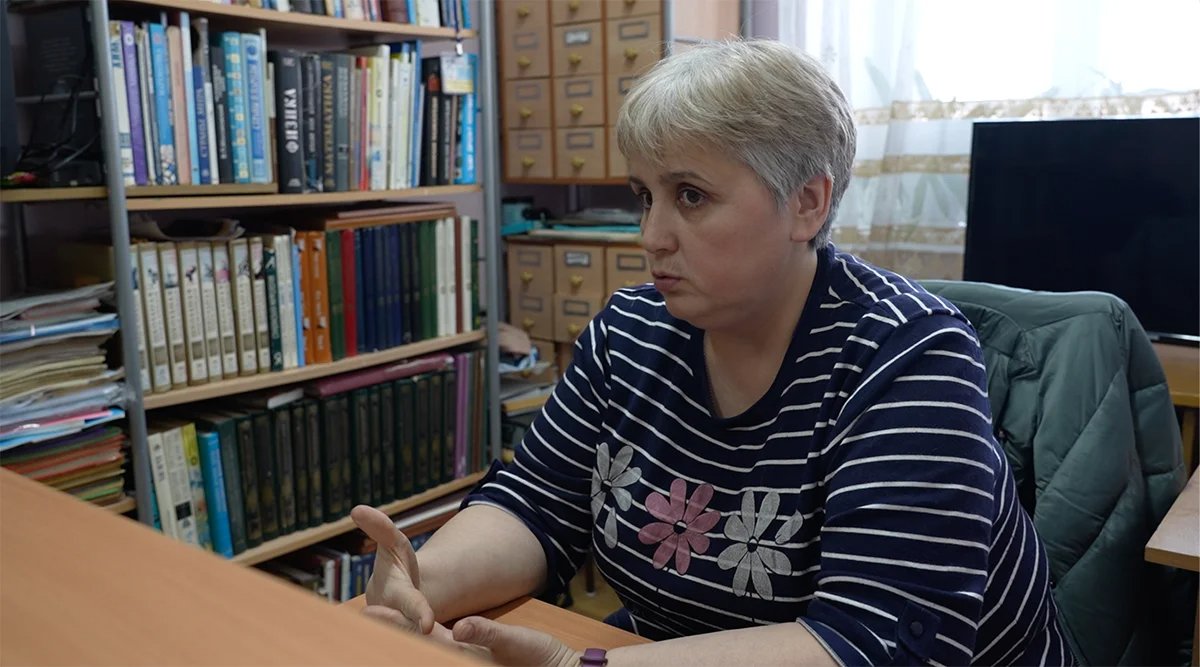
Librarian Lyubov, mother of a mobilised soldier. A shot from the film “Firewood for the mobilised”
And then the administration staff took us to the mother of a draftee whom they personally helped with firewood.
Lyubov works in the school library. Her son was taken away on 28 September. Even though he is the operator of the pumping station in Transneft, a backbone oil pipeline transport company whose employees can be exempt from the draft. But at work, they did not have time to file documents for him on time. And while they were preparing them, the son had already been enrolled in the unit.
Now Lyubov’s son is near Luhansk. He doesn’t get in touch very often, but he says that everything is fine with him. “At first, I called everyone, but when I found out that he wouldn’t get an exemption, I accepted it. He is not on the front line yet, and I hope that he will sit it out somewhere over there,” says Lyubov.
Lyubov says that she does not understand why partial mobilisation was needed.
“There are trained people, and he didn’t even have a machine gun in the army. He was a driver. And there seem to be a lot of volunteers. I hope, of course, that all this will end soon. Well, now everything will finish with this Artemovsk [former name of Ukraine’s Bakhmut — translator’s note], and then there are no serious fortifications, then it will be easier…
Well, what can speed it up? Maybe if Biden resigns in America. Now there will be new history textbooks — I am very interested what they will write about Biden there.”
Lyubov admits that before the partial mobilisation, what was happening in Ukraine did not concern the residents of the Kazachinskoye-Lena district, located 5,900 kilometres from the contact line.
“Yes, even now life seems normal. Some people don’t even watch the news, and they ask me: ‘What’s going on there?’ And I read and watch all the news. TV is still more believable, because they can write anything on the Internet, but at least there is some kind of censorship on television.”
In total, 27 men aged 23 to 40 years were mobilised from Kazachinskoye, according to Lyubov. 2,607 people live in the village.
‘Thank God he is alive’
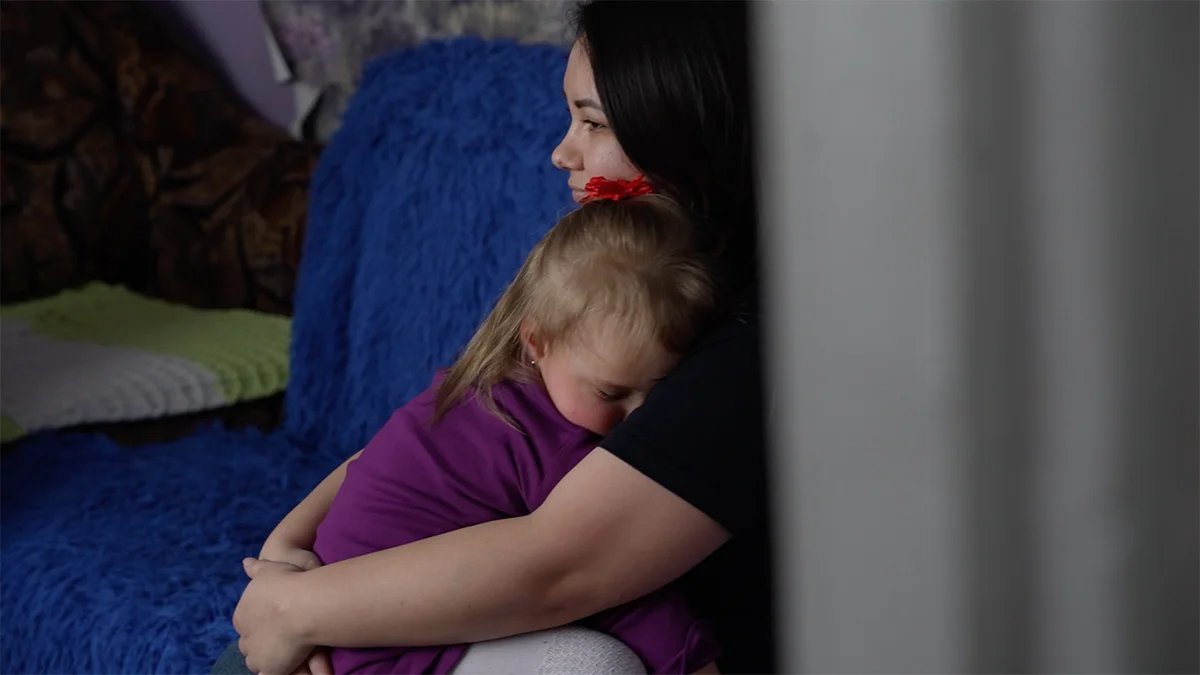
Alyona with her daughter. A shot from the film “Firewood for the mobilised”
Alyona’s husband will return home soon. Because he has been wounded. Vladislav, along with the other mobilised from Magistralny, came under fire in the Donetsk direction. Five pieces of shrapnel hit him. Now he is in the hospital.
Alyona is one of those who supports the special operation and believes that “Ukraine should give back everything that she was handed before.” She says that the villagers generally support what is happening in Ukraine.
But she admits that if her husband is sent to the front line again after recovery, she will not survive it.
“It is very difficult mentally. It’s hard to wait for him. The child, though small, keeps walking and saying, ‘Dad, Dad’… Of course, most of all I want it to end soon. All this ***. And it’s very scary to think that everything could develop even more and eventually reach here… No, I have no doubt in the Russian army. It’s just not clear how America will continue to act against us.”
The most terrible moment for Alyona was her husband’s call when he said that he would not be in touch for a month.
“And then a week later came a call from a Ukrainian number. It was one o’clock in the morning,” Alyona recalls. “It was Vlad. He said he was wounded and was in the hospital. He didn’t really explain anything. And I just thought, ‘Thank God he’s alive.’ We talked again in the morning, and he said he was going home.”
Vladislav’s family is promised help and is already receiving some: they offer to send him to a sanatorium, and schoolchildren from the military-patriotic centre “Sarma” helped Alyona to split firewood.
“Without them, I don’t even know what I would do. They themselves offered to help me, they chopped firewood themselves… Of course, there are a lot of things that need to be done around the house: the roof needs to be changed, and the patio repaired, but you can somehow live with it. The most important thing is for my husband to return.”
Finding identity
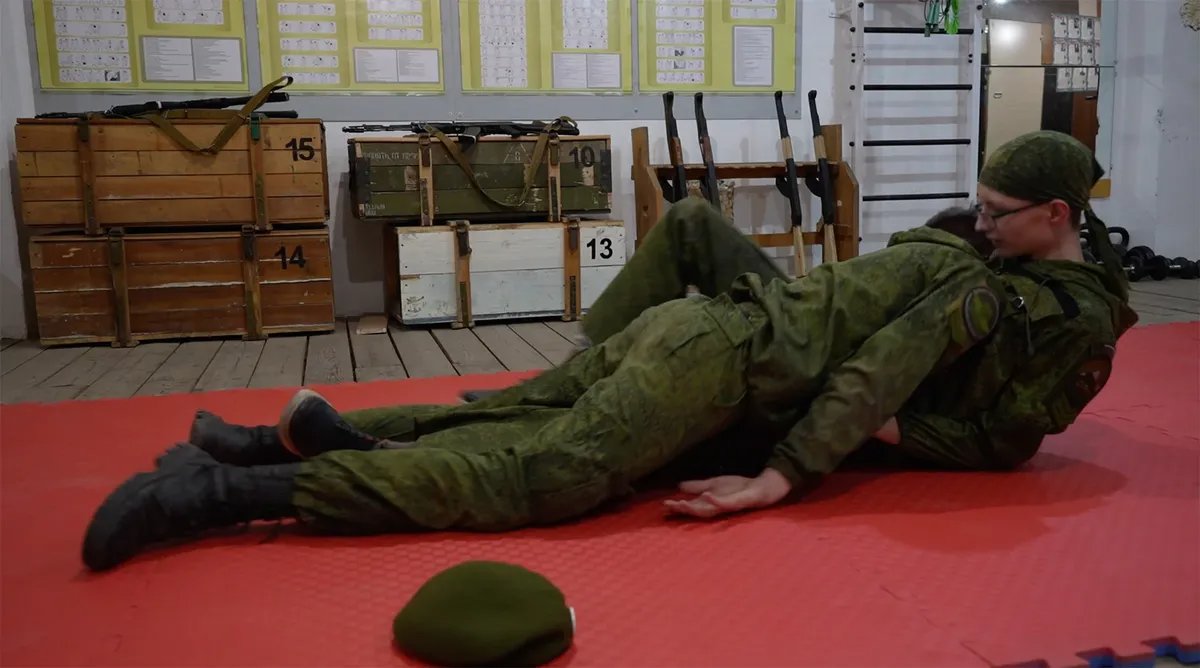
Schoolchildren in the classroom at the Sarma club are practicing the evacuation of the bodies of the dead. A shot from the film “Firewood for the mobilised”
Sarma is a word used to refer to the wind blowing in the middle part of Lake Baikal. At times, it reaches hurricane speed. And it is also a military-patriotic centre in Magistralny, located in the basement of the local administration building.
Going on eight years, a former employee of the Criminal Justice System (now the Federal Penitentiary Service), Sergey Terekhov, has been teaching children to shoot rifles, assemble machine guns and throw knives. He has three dozen pupils, three of them have fathers who were mobilised.
Sergey, of course, is a patriot — in the sense that the word is generally used today. He says this about the conflict in Ukraine:
“There is nothing good in this ***. But they made it clear to us that if we didn’t do anything, it would be worse. And we made a warning strike. Moreover, the strike is not aimed at destruction, it’s simply about the advance of troops, the capture of key points.”
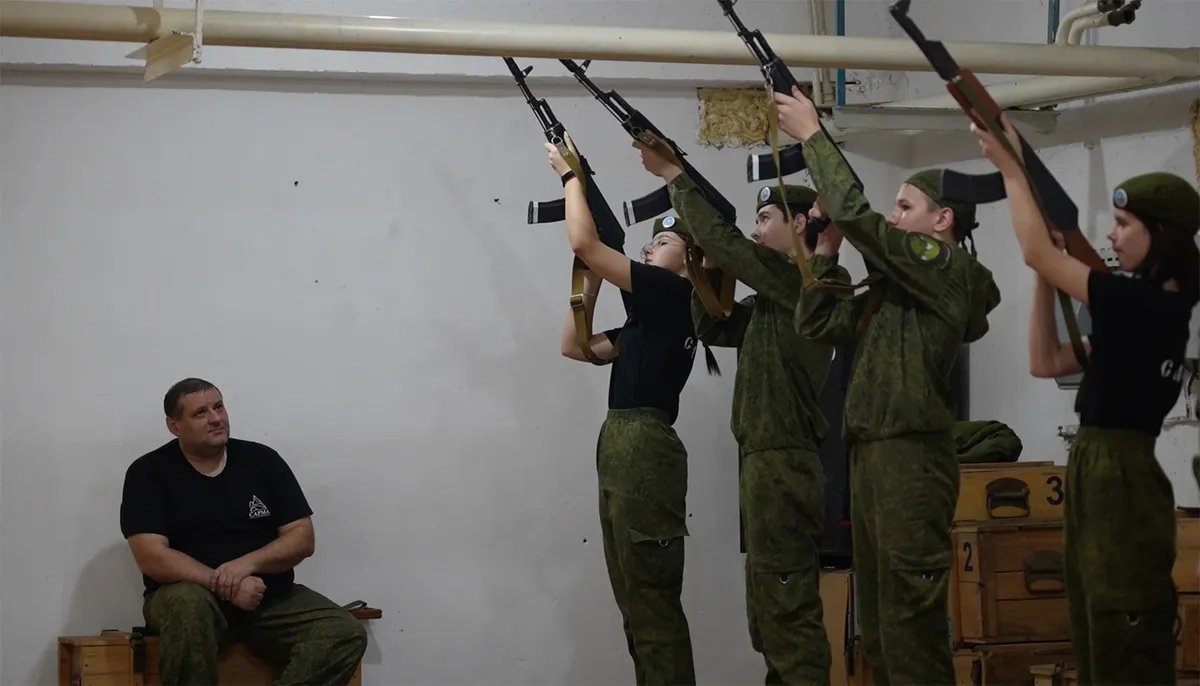
Sergey Terekhov with his students during the classes in “Sarma”. A shot from the film “Firewood for the mobilised”
So Terekhov approaches the upbringing of children “patriotically”. On the day when we come to the Sarma, schoolchildren in camouflage work out a drill step in groups, throw knives and shoot from air rifles. And they also train to take out the bodies of killed comrades from the battlefield.
“Drill, rigorous training — they discipline children,” explains Terekhov. “They get it into their heads that you are a military unit, if someone behaves badly, it will affect everyone. It’s good for them. They overcome themselves, they have no desire to retreat. And through merging with this ‘mass of little green men’, they find their identity.”
Among other things, on the day of our arrival, schoolchildren from Sarma practised giving military honours — soon they will be on duty at the funeral of the first deceased draftee from Magistralny.
‘He was sitting in the tent all the time’
Ksenia is 29 years old. She has two children. And she’s a widow.
The kids from Sarma are preparing for the funeral of her husband.
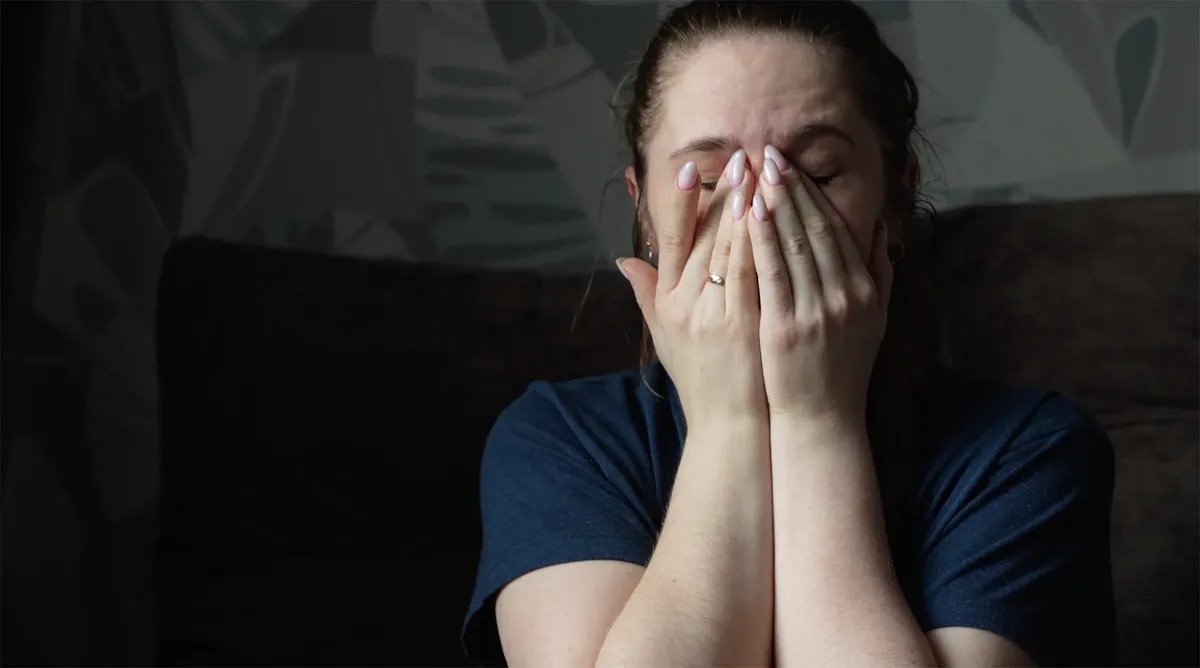
Ksenia, a draftee’s widow. A shot from the film “Firewood for the mobilised”
“Alexey and I started dating at school, I was 17 years old,” she recalls with a smile. “I saw him off to the army, waited for a year, then met him from the army. Then we had children. He would be 33 years old now…”
“When the partial mobilisation began, I told him: ‘Look what’s been announced.’ He replied, ‘Well, what are you worried about?’ I say, ‘You will fall under it!’ He said: ‘We’ll see…’ He didn’t tell me at first that he got a call from the military enlistment office. Only two days later he said that he had to go there on 26 September. And on the 28th, he was already taken away from the village — along with other guys.”
When the mobilised were sent from Magistralny, some were putting on a brave face, but Alexey was crying. He didn’t want to leave his family. He reported from the military unit that they were not being trained for combat operations.
“He said that there was no training. Every time I called him, he was sitting in the tent. They went to medical classes a couple of times, fired guns a couple of times, but mostly just lay in a tent, and that’s it. But they sent him to the assault squad,” says Ksenia. “That’s the result. Three guys are still in the hospital in Makiivka. I have a cousin there; he has a fracture of the femur and a laceration. He was also mobilised. He was taken away even though he had one kidney. Even a man in a wheelchair was sent a summons… Only when he arrived in a wheelchair, then they let him go.”
Ksenia found out about her husband’s death after a call from Alexey’s sister.
“I remember that it was early in the morning. My phone was charging. I was sleeping. Suddenly, my daughter runs up to me, says: ‘Aunt Natasha is calling you.’ Natasha said that one of our guys posted that he was wounded. And this post said: ‘To all the guys who died, we will remember you.’
“I wrote to Alyona: ‘Did Vlad call?’ She says, ‘Yes.’ I asked: ‘What happened?’ She said: ‘They’ll call you.’ Then she gave me Vlad’s number and asked me to dial him.
Vladislav said that shortly before Alexey’s death, the mobilised had been pulling the wounded from the battlefield.
“And the ‘birds’ [drones] started hammering them. Vlad lost consciousness. And when he came to, he asked about Alexey, and they told him that Alexey was dead. Then I called another person, and he said that Alexey was in an explosion. That his leg was torn off, and he died from a great loss of blood. The whole blow came on him. He lived for another ten minutes, and all these ten minutes he was changing clips in his machine gun…”
Alexey’s body was taken from the battlefield on the fourth day. Ksenia has not yet been able to tell the children about his death.
***
…The firewood assistance program for families mobilised in the Krasnoyarsk and Irkutsk regions is expanding: budgets for 2023 are being laid. And there are more and more reports about firewood delivered and chopped by volunteers. Such help is needed, because since 2000, fuelwood, according to the profile publication Forest Complex, has increased in price 22 times, and not everyone can heat the stove at their own expense.
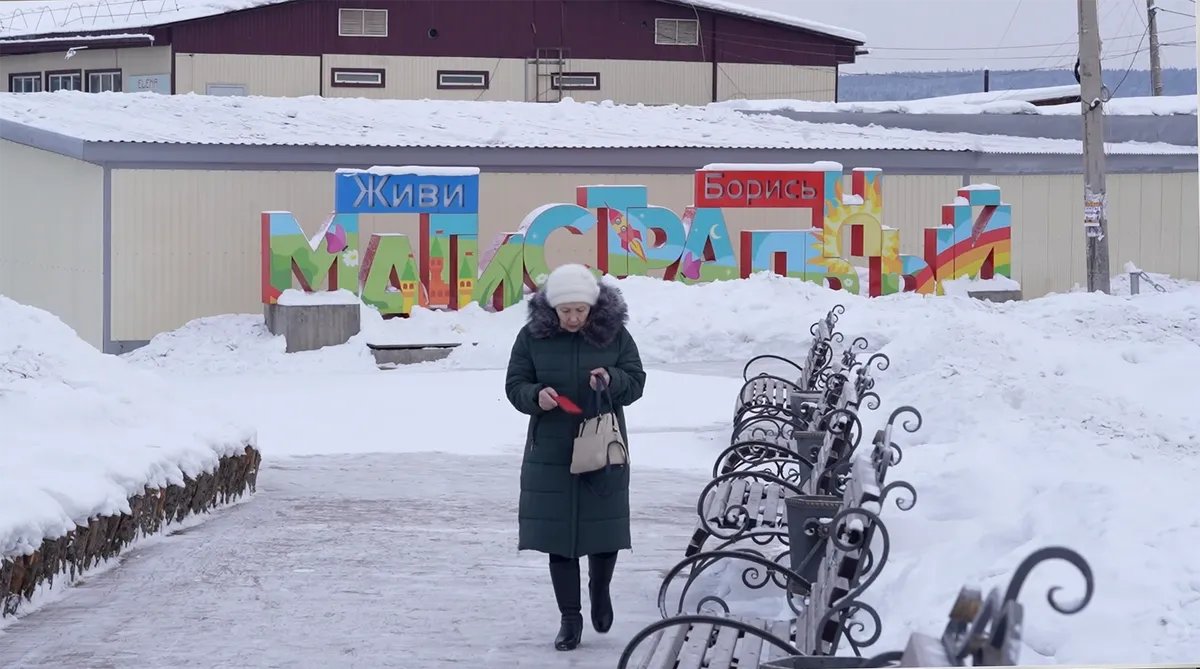
‘Live. Fight’: a mural in the village of Magistralny, Irkutsk region. A shot from the film “Firewood for the mobilised”
They don’t promise much gas to Siberia. By 2027, gasification of the Irkutsk region is planned to be increased from the current 1% to 3.2%, and in the Siberian Federal District as a whole, blue fuel should arrive in 140 settlements. But Gazprom’s supplies to China are increasing: it is planned that instead of 4.1 billion cubic meters per year pumped, they will reach 48 billion cubic meters by 2025. They even write about it with some pride.
People in Siberia are not picky, they are undemanding. They are common people. They can live without heat, sleep in warm clothes, and be content with just chicken. The country relies on such people. The state comes to them when it is looking for people to draft in the army.
The state pays their relatives back with firewood. And coffins.
Join us in rebuilding Novaya Gazeta Europe
The Russian government has banned independent media. We were forced to leave our country in order to keep doing our job, telling our readers about what is going on Russia, Ukraine and Europe.
We will continue fighting against warfare and dictatorship. We believe that freedom of speech is the most efficient antidote against tyranny. Support us financially to help us fight for peace and freedom.
By clicking the Support button, you agree to the processing of your personal data.
To cancel a regular donation, please write to [email protected]
